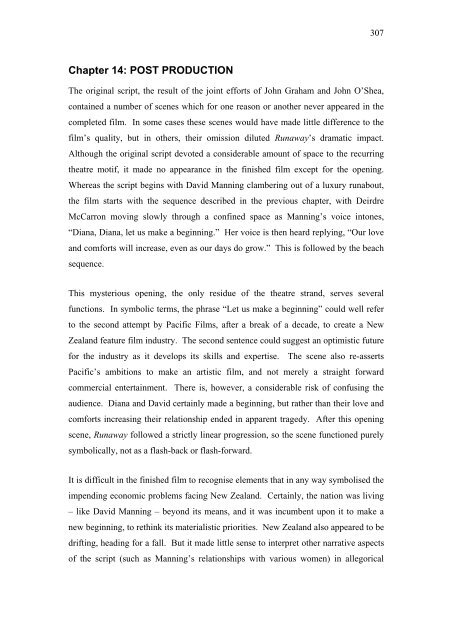Copyright Statement - ResearchSpace@Auckland
Copyright Statement - ResearchSpace@Auckland
Copyright Statement - ResearchSpace@Auckland
Create successful ePaper yourself
Turn your PDF publications into a flip-book with our unique Google optimized e-Paper software.
Chapter 14: POST PRODUCTION<br />
307<br />
The original script, the result of the joint efforts of John Graham and John O’Shea,<br />
contained a number of scenes which for one reason or another never appeared in the<br />
completed film. In some cases these scenes would have made little difference to the<br />
film’s quality, but in others, their omission diluted Runaway’s dramatic impact.<br />
Although the original script devoted a considerable amount of space to the recurring<br />
theatre motif, it made no appearance in the finished film except for the opening.<br />
Whereas the script begins with David Manning clambering out of a luxury runabout,<br />
the film starts with the sequence described in the previous chapter, with Deirdre<br />
McCarron moving slowly through a confined space as Manning’s voice intones,<br />
“Diana, Diana, let us make a beginning.” Her voice is then heard replying, “Our love<br />
and comforts will increase, even as our days do grow.” This is followed by the beach<br />
sequence.<br />
This mysterious opening, the only residue of the theatre strand, serves several<br />
functions. In symbolic terms, the phrase “Let us make a beginning” could well refer<br />
to the second attempt by Pacific Films, after a break of a decade, to create a New<br />
Zealand feature film industry. The second sentence could suggest an optimistic future<br />
for the industry as it develops its skills and expertise. The scene also re-asserts<br />
Pacific’s ambitions to make an artistic film, and not merely a straight forward<br />
commercial entertainment. There is, however, a considerable risk of confusing the<br />
audience. Diana and David certainly made a beginning, but rather than their love and<br />
comforts increasing their relationship ended in apparent tragedy. After this opening<br />
scene, Runaway followed a strictly linear progression, so the scene functioned purely<br />
symbolically, not as a flash-back or flash-forward.<br />
It is difficult in the finished film to recognise elements that in any way symbolised the<br />
impending economic problems facing New Zealand. Certainly, the nation was living<br />
– like David Manning – beyond its means, and it was incumbent upon it to make a<br />
new beginning, to rethink its materialistic priorities. New Zealand also appeared to be<br />
drifting, heading for a fall. But it made little sense to interpret other narrative aspects<br />
of the script (such as Manning’s relationships with various women) in allegorical















